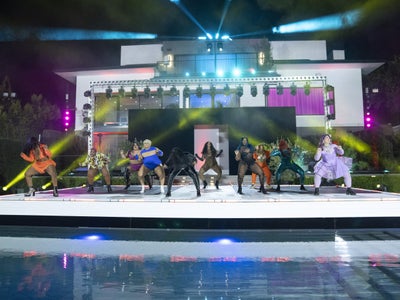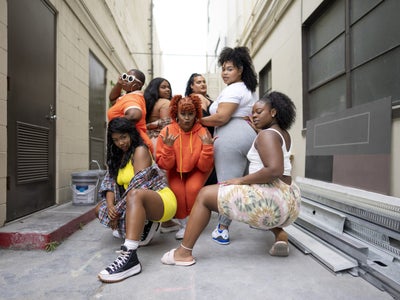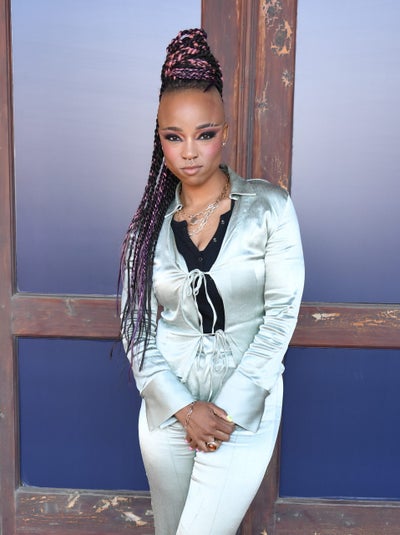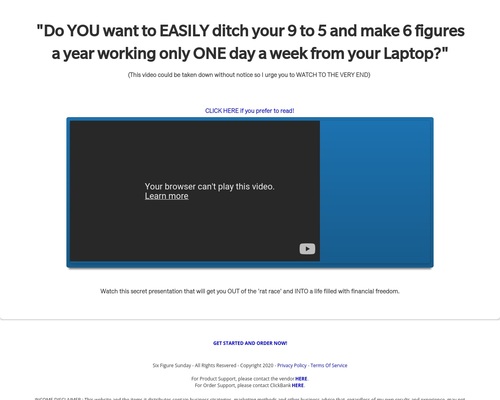
[ad_1]
When Nneka Onuorah was first nominated for a Creative Arts Emmy, she didn’t even know it. The director of Lizzo’s Watch Out for the Big Grrrls was in London, already knee-deep in another major project — with Megan Thee Stallion no less– doing what she does best, “working constantly,” as she tells us.
“I looked down at my text messages, and I saw all of these texts saying, ‘Congratulations. Congratulations lady!’ And I’m like, ‘On what? What is everybody talking about?’”
What everyone was talking about were the six award nominations the popular Prime Series received, including Outstanding Competition Program and Outstanding Directing for a Reality Program, the latter of which Onuorah won Saturday night.
Ahead of her win, we talked to Onuorah about directing this project through a new lens, her background as a plus-size dancer, and the legacy she wants to leave as a director and filmmaker.
Article continues after video.
How did you get attached to this project?
NNEKA ONUORAH: Lizzo and Makiah Green and Myiea Coy, they’re two Black women who were executive producers on the project, reached out to me because they had met me at other meetings at other companies, and they were trying to figure out who would be the best director for this series. Because it is a dance show, there’s competition aspects to it, and they wanted the story and the visuals to feel different and feel personal and have someone respect the stories. And they knew I used to dance. I used to be a plus-size dancer actually, in the industry before I even started directing.
So they called me, and they said, “We have this project, and we want to make a difference.” So when they called me, I was like, “All right, let me throw something together.” So I went back in it, and I said, “I never did the reality genre before, so how can I be authentic in this experience?” So I said, “I’m going to call it docuality, and bring myself to it, and change the way that they do everything.” And I said that I really wanted to make people feel immersed in the people and the spaces that these women occupy. I want them to feel their bodies. I want them to be in their bodies. So my approach was docuality, and they loved it. Amazon loved it, and they brought me on.

As rampant as fat phobia is, audiences have really embraced this show which has been pleasant to see. Why do you think that is?
ONUORAH: I think audiences embraced the show that way is because I feel like we were very strategic in how we presented this story. These are girls who are part of a dance competition, sharing the nuance of their stories. A lot of people when they tell stories, they just tell you the same commercialized monolithic point of view like, “Oh, if plus-size women are big, they must be sad and down, and they can’t move and they can’t dance.” But we didn’t treat it like that. These are women who are dancers, who are competing, who are beautiful, bold, and they all have different stories. They come from different countries. Someone’s trans, someone’s a Christian, someone’s, you know, from Korea, someone’s Spanish.
There’s all different types of nuances to the story. And we focus on the nuances of them as human beings, and we highlighted the things they experienced. But a lot of what they experienced, beyond what their size was, everyone experiences, you versus you, trying to make it through a bad day, sisterhood. I think we leaned heavily into sisterhood, which is important for me and Lizzo and the other Black executive producers, because we knew we’re not about to be on TV, looking like we’re creating stakes and trying to create this environment that’s toxic to these women. A lot of people don’t understand that. Being plus size, being Black, being a woman, being trans, being so many different things is already a stake in itself. So I feel like what reality television meant to actually do in the beginning, to be real, I feel like we really were real. So I think that’s what made it feel different is these women feel real, you’re not really paying attention to just their sizes. That is the beauty about them, but there’s so much more to this series, I feel like. And I think that, that creates a readability.
And then beyond that, I really tried to make the visuals. I didn’t put them on tripods and make the cameras all stationary. I made my cameramen walk up to the girls and be very fluid about shooting. And I made a specific camera just to romanticize the body, because I wanted them to have to interact with these women in that way when they’re filming them, so that when people are watching it, they’re loving it. I was like, “If you see something jiggle, lean into that. Don’t back up. Don’t try to cover nothing up. Treat it with respect.”
So that’s how I approached it. And I made every person that was on set have to embrace, experience and be in it. So I feel like through the lens and through the screen, people just felt like they were in it, and these are their family members, or their sisters, or whatever.

What was it like working with Lizzo?
ONUORAH: It was amazing working with Lizzo. There’s so many reasons it’s amazing working with her. She’s so funny, she’s so bold. She says the wildest things out of nowhere, out of the air, and you don’t know what to expect. So it’s good to have that unpredictability, because it helps set the tone for the show and for the good energy for the girls. And what I also loved about working with Lizzo is she’s extremely professional and down to do what you want to try. When you work with a lot of talent, every talent doesn’t comply to creatives at times, but she was willing to try things with us.
And she put her money where her mouth is. All the girls are in her videos, they’re performing at award shows. These girls are booked, and she did what she set out to do, and it’s real life. So just knowing that someone’s not just talking and trying to pretend to be for their own interest, but actually making a difference in women’s lives, and therefore through this, so many more will have opportunities. So I think that’s the best part about working with her.
How did you personally get into dance?
ONUORAH: Initially, I got into dance, like a lot of us Black people, the Black church at first. I used to be a praise dancer when I was growing up, and that just told me that I could actually move a rhythm. My dance teacher told me, “Do you know you can dance?” And I was like, “I can?” I had no idea.
I moved back to New York from Georgia, and I was working, basically dancing at Broadway Dance Center. And then I got hired as an assistant to a lot of the big choreographers that were choreographing for some of the biggest artists, like Janet Jackson and all the big names at the time. And that got me into dance, just training at Broadway Dance Center. I loved to move. I loved to tell stories.
When I was a child, I used to have my friends do a dance to Destiny’s Child “Say My Name, “and they thought we were just playing the game, but I took everything so serious. So I made them do it over and over and over again until they got it right all the way through. And then I started to realize, that’s directing. So I feel like dance was the early stages of recognizing that I was a storyteller.

How would you characterize your experience being a plus-size dancer at that time?
ONUORAH: At the time when I was a plus-size dancer, I feel like people thought I was just dancing for fun. I don’t think people thought that there was any longevity, and there wasn’t anyone for me to really look up to. There was a lot of choreographers who were plus size, but you would see them choreographing but not dancing. And I would be like, “Why is that? Why are they teaching, but they’re not with the artist.” So I feel like it was just a matter of people don’t do things unorthodox that they don’t see. They try to naturally match the artist, which means also more plus size artists need to be out there. Because if they were more plus-size artists, it can’t be just Lizzo. You know what I’m saying?
So if they’re trying to match what the artist would look like, then that means we need more plus size artists and artistry, and that needs to be a more widely expressed thing. So I think that I even probably was like, “Well, I know this is only going to go, but so far for me.” So I transitioned into other things, which is why I was so powerful. I was so passionate about watching the girls go through this process, because it’s like, “You can, and you will.” You know what I’m saying?
How did you make your transition from performing to going behind the scenes and directing?
ONUORAH: Well, I was dancing, like I said, working in a dance studio. And then when I was going to college, I initially was like, “Well, I have to do an internship.” And I was studying psychology, actually, at the time, but I was like, “I want to do something fun, because I’m going to be in school for 50 years, it seems. I’m going to get my doctorate, so let me do something fun that I enjoy.” So there was a BET or MTV internship, and I decided to take the BET one, and they put me with the president of the company, Steven Hill, who did all the BET awards. I got hired within a month, because I beasted through that internship. I literally would stay overnight. Sometimes I would work in every department. And Steven was the president of the company, so I got to see his meetings from the top down, and it taught me business strategy and stuff like that. I was just trying to find my way, and I was like, “I really want to be the person who is in charge of the creative itself, and then also the creative strategy. How are we going to get from point A to point B?”
So I worked in television, doing award shows, like BLACK GIRLS ROCK! and other shows for years. And then finally, after seven years, I was like, “I’m going to quit because I want to tell my own stories. I want to have agency. I don’t want to sit in a meeting and ask someone for permission to tell a story that needs to be told, and I’m told no because it’s not important.” So I went and made my own documentary, The Same Difference, in 2014, and I spent my own money on it, all my savings. And I would take the cameras from work. And when people would come interview for 106 & Park, or certain things, I’d be like, “Do you mind doing an interview for my documentary?” They’d like, “Sure, I’m here.” I did all that until I got a movie together. And it did so well that it toured like 250 cities in all different countries, every continent. And I started becoming an independent filmmaker, and it really took off for me. And then I started working with the HBOs and Netflix, and I’ve now directed President Obama. I’ve like got to work with Lizzo. The career has just been a continuous blossoming ministry, it feels like.
What has it meant to you for your work to have this impact in both the body positive and queer space?
ONUORAH: It’s meant the most to me, because I actually create this work. I started creating this work because I wanted to do a Q&A. I went to this film Pariah that was by Dee Rees, and I went to go see it while I was working at Viacom and the Paramount movie theater, and she gave a Q&A. And I remember people being so impacted by the work that it made them think about themselves. And I was like, “Wow, that type of healing, it would be amazing to do it through a creative aspect.” Healing comes in creativity as well. And I knew that was a part of my mission, so I was like, “How do I have a Q&A?” That was my goal. So I said I’m going to make a movie.
So I made a movie. And what I ended up doing, I did so many film festivals all across the globe. I was having this queer conversation before there was any conversation around nuance. Before, it was just masculine or feminine .It was Butch/fem dynamics. And then that film opened up so much conversation around non-binary trans conversations and all those nuances. So I basically had that conversation in Australia, I had it in Africa, I had it in Jamaica, I had it in China. I had it in Paris. I had it in the white area in Paris. I had it in the Black area in Paris. And that really gave me my education and my social intellect on the world. It was almost like I was getting the creativity and the psychology stuff at the same time. So knowing that now we have so many non-binary actors and actresses, knowing that more women are comfortable presenting either way, knowing that people are coming out from the underground now and being able to shine and be proud of themselves. Think about a person in Nigeria who’s never thought they saw a person like them, that they never existed, and just that they could see themselves, that opens up a whole big world for more and more stories to be told, and people to just feel seen and want to live another day.
I feel like I’m doing my work’s purpose, and any project that I’ve ever done is always tied to a cause. I’ve never taken any project that’s just like, “Oh, this is for some Hollywood stuff.” I’ve never been into that. I literally enjoy being with my community, making a difference, and making people feel that self love.
[ad_2]
Source link







